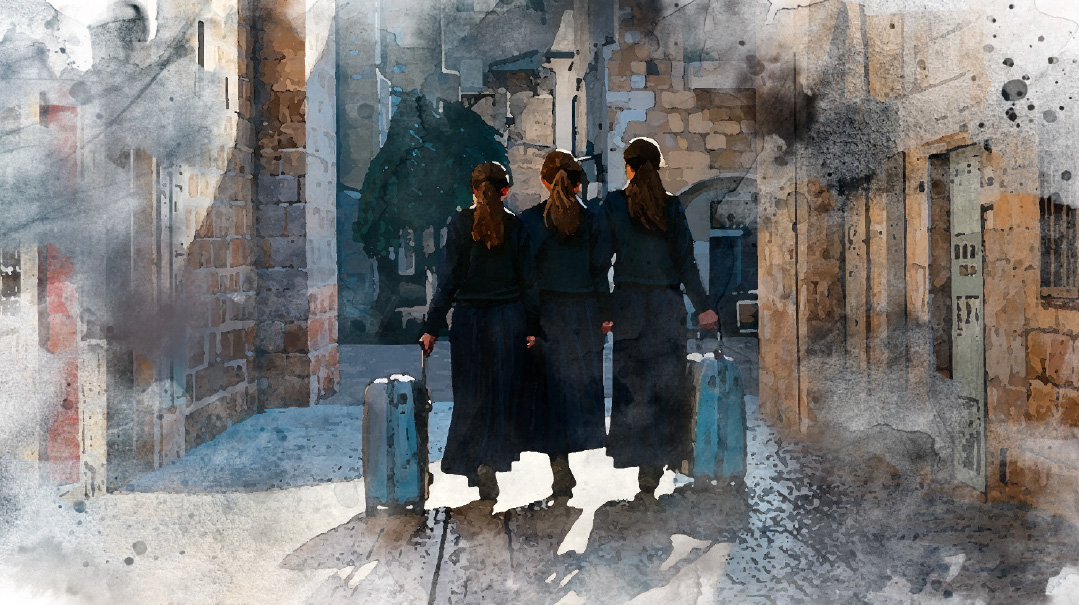Goodbye, Girls

That wide-eyed wonder, that ability to be moved and stirred to change, is something we should never graduate from

BY
the end of this week, the streets of Yerushalayim will be devoid of those packs of seminary girls in their pleated skirts and ponytails. Buses will be quieter. Cafés will be emptier. Thursday afternoons in the park will look different without those fresh-eyed, helpful teens manning double strollers while guiding tricycles and distributing snacks.
Seminary girls are an endemic part of the city’s landscape. Over the years, their favored bags may shift from wristlets to cross-bodies to fanny packs, along with the evolving brands of shoes, sweaters, and hair accessories. But the “look” remains pretty uniform, and along with the exterior, there are certain underlying dynamics that just don’t change.
One of the interesting characteristics of seminary girls is their hybrid resident-outsider status. A few weeks after their arrival, they learn the ins and outs of their new residence’s transportation system, currency, and eateries (if you want to know the bus schedule or the best place to buy ice coffee, they’ll be happy to share their expertise).
Yet as much as they move to the rhythms of Yerushalayim, they don’t miss a beat of their households across the ocean. You’ll overhear them on the phone with a sister back home, discussing what outfit she should wear to the neighbor’s vort, planning a birthday party for a younger sibling, or making menu suggestions for a Chanukah party. They’re apart from yet a part of their families, even from thousands of miles away.
The distant-yet-connected life is something that’s built into the system for our yeshivah bochurim, an environment they’re planted in for years and that is key to their growth. For our girls, though, it’s more of a blip — a ten-month experiment that’s over almost before it begins. Even though the seminary year has become a given, there’s something slightly surreal and unnatural about the idea of girls living in a dorm and learning “full time.”
During my own seminary interview, I was bold enough to ask Rebbetzin Bruria David a”h how this innovation had come to be. It seemed so unnatural, so foreign, for a girl to leave the roots and rhythm of family life for an extended time.
“Isn’t seminary a strange concept?” I wondered aloud. “It’s supposed to prepare us for life, but it’s so removed from what we hope our lives will be. Dorm life is so different from family life. Intense learning and reports and tests have very little to do with the roles we hope to fill in the future. And a year’s worth of Shabbosos spent on the receiving end… it just seems so different from our long-term aims.”
In hindsight, I would say that my question probably wasn’t the best way to get accepted into seminary. Fortunately, Rebbetzin David didn’t take it as a disrespectful critique. Here’s the gist of her response, as best as I remember it:
“You’re right that seminary is not reflective of the rest of your life. I see seminary as a shemittah of sorts. The year of shemittah is wholly different from the other six years of the cycle, and it’s not a lifestyle that’s sustainable on a permanent basis. But our hope is that the spiritual benefits of this year will spill over into the rest of your life, and that the flavor of your shemittah year will inform and influence the decisions and priorities of the years that follow.”
What struck me most about seminary — and still strikes me, as I watch from the sidelines — is the opportunity to put the focus on the self. This is not the same as selfishness. It means a chance to view yourself slightly apart from the family unit. To ask, not from a place of rejection or rebellion, but rather of genuine curiosity: Can I tweak, amplify, or refine the tool kit I’ve been given? I know I’ve always done this or thought this or said this, but does it take me where I want to go? Does it fit the person I want to be? And who am I, really, when my family is far away and I’m a guest at someone else’s table?
The clichéd seminary girl makes it a goal to sample every flavor of ice cream in Katzefet. But the stereotype holds a certain truth: This year is marked by an openness to taste and experience the new and unfamiliar, to experiment with flavors and approaches within Yiddishkeit without automatically discounting the untested as “not my type.”
Some seminaries see truly transformative processes, where girls commit to new values and intentionally change lanes. But most girls, if they’re coming from a healthy place, are going to build households similar to the homes they grew up in. For these girls, seminary isn’t a year of reinvention — but it is a year of thoughtful sampling, mental note-taking, and that shemittah experience of breathing rarified air atop new peaks and redrawing an internal vision of what is possible.
In a lot of ways, this year is a last stop. For many of these girls, it will be the last time they are served sustained, formal learning in just the right portion size. It will be their last chance to have someone else arrange their schedule with balanced doses of education, inspiration, and recreation. It may be their last opportunity to revel in an environment where you can plop down in a circle and sing, just because. It’s sad to say goodbye to that.
Then there are the things no one will miss. The tight spaces, the cramped quarters, the time difference are challenging. The pressure of being a guest every week is not easy — not just because it’s uncomfortable to make phone calls and ask for meals, but because it’s an unnatural feeling to be on the receiving end, with no home base, week after week. Being rooted in a home, in a family, is something we all crave. As much as it hurts to say goodbye to the stark stone-sky landscape of Yerushalayim, the environment that best nurtures a Jewish soul, it’s also natural to feel at home when you’re home.
So to the departing seminary girls, I would say: We’re going to miss you, but we understand. This surreal shemittah existence isn’t meant to last forever. But it can and should spill into the mundanities of all those future acts of planting and harvesting, investing, and reaping. Keep that sense of awe, the ability to find something amaaaazing even when you’re immersed in rote and surrounded by cynics. That wide-eyed wonder, that ability to be moved and stirred to change, is something we should never graduate from.
And enjoy the family that’s been waiting for your return. Make sure they enjoy you, too; find satisfaction, purpose, and identity in belonging to something bigger. But every now and then, remember the year you spent in the city of sacred stones and blue, blue skies. Remember the time you focused on the individual who’s both part of and apart from the family — and check in with yourself.
(Originally featured in Mishpacha, Issue 1065)
Oops! We could not locate your form.







